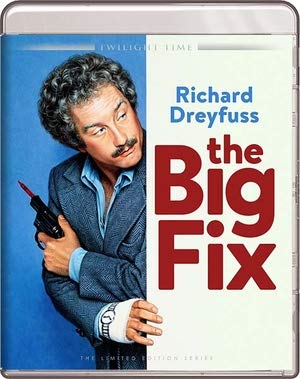
Despite being such a sunny city, Los Angeles is the home of noir. All those sun bleached streets are hiding the deepest shadows. Many of the best literary mystery writers set their stories. Ray Chandler’s Philip Marlowe and Ross MacDonald’s Lew Archer hit the mean streets of Los Angeles, as does Harry Bosch and the various morally-conflicted cops of James Ellroy’s various pitch black noirs. Unique among this varied crowd of detectives is Moses Wine.
Philip Marlowe was a white knight of the streets. Lew Archer was WWII vet and amateur psychologist who found social ills at the foundation of the crimes he solved. Moses Wines… was a hippy. In a series of books written by Roger L. Simon (who also wrote the screenplay), his detective is a leftist Berkeley grad who went to war protests, took seriously all kinds of movements that would look a little embarrassing a decade later and who only became a detective to make child support payments to his ex-wife, who flits from one ’70s communal fad to the next. He’s a cynic, and like George Carlin says, “Inside every cynical person, there is a disappointed idealist.”
The Big Fix is a mystery about disappointed idealism. Barely making ends meet, Moses Wine is the last person who would want to be on Senator Hawthorne’s payroll. Though the movie eschews political labels, Hawthorne is clearly the Democratic candidate for Governor of California. One of his campaign workers is terrified that posters with a photograph of the Senator with left-wing radical Howard Eppis are being posted around town, tarring the moderate-Democrat with the stain of a communist terrorist clearly based on Abbie Hoffman. Hoffman famously wrote the radical book, Steal This Book – in the movie, Eppis is the author of Rip This Off.
The last thing the modern Democrats want is association with the radical ’60s, so the radical detective Moses Wine is sent to find the source of these scurrilous posters. Accompanying him is the former girlfriend, Lila (Susan Anspach), a Hawthorne staffer who talks a lot about female empowerment and generally tries to get in his way while he’s doing his job to prove she don’t need no man. Doesn’t mean she won’t start dating him again (as long as she doesn’t have to cook) and that she won’t use her feminine wiles to bamboozle some of their interviewees when Moses’s detective skills aren’t getting the job done.
Moses Wine is played by Richard Dreyfuss, and it is a distinctly Dreyfussian performance. At turns jokey and emotional, he’s a deliberate departure from the cool as ice detective that’s unflappable even as bodies fall around them. Moses cries. He whines. He complains, he jokes. And he works his case often while having to lug around his two kids, since his ex-wife is kind of a flake.
On the trail of the poster printers, Moses finds himself picking up an older mystery: the disappearance of Oscar Procari Jr. Son of a wealthy industrialist, Procari Jr. used his father’s money to bankroll radical activities, including the California Four, a small-scale terrorist group that included Eppis, farmer’s right’s activist Luis Vasquez, and the Linkers. The Linkers are a married couple who actually set some bombs, leading them to life sentences in prison.
When Moses goes to interview them in jail, they have a radio set up to blare some oldies so the police can’t overhear their conversation. All four, the Linkers, Moses and Lila sing along to “Why do Fools Fall in Love?” while interspersing the lyrics with their questions. It’s a quirky scene, and emblematic of the film’s narrative style – playful and quirky, except when it comes to death (which is infrequent, but taken seriously) or when looking at the legacy of the ’60s. While a decent detective mystery, The Big Fix is mostly an elegy for that lost time. In his investigation at some point Moses watches some old archive film about Howard Eppis, a piece for a news broadcast with footage from old protests edited in. There’s no earthly reason for Moses to be watching this – he knows all about Eppis’s activities during the Vietnam War, but the point is to look back on what he thought were the most important years of his life, where he was trying to make a difference, and have himself a good cry.
It also contributes to the film’s rather languid pace. The mystery unfolds deliberately, with as much time early on given to the rekindling romance between Lila and Moses as to finding out who was trying to sabotage the Hawthorne campaign. There’s not much in the way of action: a single car chase, a shootout, a home invasion. Moses gets kidnapped once, but it’s by a bunch of Chicano activists who don’t really mean any harm: they just want to know where Luis Vasquez is. Everyone has someone they can’t find in this movie.
The Big Fix is a ’70s movie about the ’60s, a detective story as interested in memorializing a generation as it is in its crime plot. It balances a few different tones, of quirky comedy, melancholy nostalgia, and hard-boiled detective thrills, though it doesn’t always get the ingredients right, sometimes being too goofy. Not for anyone allergic to Baby Boomer nostalgia, The Big Fix is a decent mystery story, an expose of the death of the hippy dream, and a middling comedy.
The Big Fix has been released on Blu-ray by Twilight Time Movies. The only extras included are an isolated film score, and a short essay in the booklet, written by Julie Kirgo.